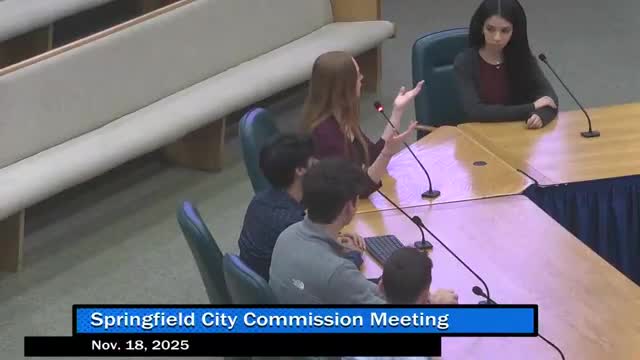Youth advocates tell Springfield leaders to oppose House Bill 172, say parental-consent rule would block student mental-health care

Summary
Students from BATS, a youth-led prevention group, told the Springfield City Commission that House Bill 172would require parental consent for nearly all school-based mental-health services and create barriers for students in unsafe or unsupportive homes. Commissioners praised the testimony and several said it changed their thinking.
Members of BATS, a youth-led substance-use prevention and mental-health group, told the Springfield City Commission during a work session that they oppose Ohio House Bill 172 because it would require parental consent and restrict students' access to school-based mental-health care.
"So what BATS is, like you said, bringing awareness for to students," Mary Cunningham said, identifying herself as president of BATS and a senior at Miami Valley School. "We are a youth led group, with about 50 members ranging ... 10 different schools in the region." She said the group recently visited the State House to oppose HB 172 and asked commissioners to "listen with an open mind."
The students said the bill, as they described it, would eliminate current pathways for students to get help without parental consent and force nearly every student to obtain parental permission before receiving mental-health resources at school. "House bill 172, if it were to pass, would eliminate this access to mental health resources without parental consent and require every student in any in every situation to get that parental consent," Immerson Davian, a junior at Springfield High School and vice president of VAPS, said during the presentation.
Usaid Ashraf, a junior at Springfield High School, told the commission a classroom disciplinary moment underscored the point: when a student was sent to the office for possessing a vape, the student's mother focused on the rule violation rather than signs of emotional distress. Ashraf said that reaction illustrated how parental-consent requirements could prevent students in real need from getting help. "It showed me that it wasn't just the vape that was the problem," he said, "it was the fact that the adult responsible ... wasn't making changes for the student, wasn't helping him to better his mental health."
Anya Amir, a ninth grader, cited Youth Risk Behavior Survey figures she said show 50% of middle-school students and 40% of high-school students lack a trusted adult. She argued that making access conditional on parental consent will push vulnerable students toward harmful coping mechanisms. Jack Hill, another student speaker, said the bill would "sever" ties between students and trusted adults at school and warned of statewide effects.
Commissioners responded with praise. Mayor Roo said he initially would have been "pretty resistant" to students accessing counseling without parental knowledge but that the students' testimony had been "compelling" and changed how he thought the issue should be approached. Commissioner Brown and others commended the students for their preparation and civic engagement.
Beth Dixon, the group's adult ally, said the BATS website (search term: "bats youth led") lists sponsors and events and encouraged residents who want to help to contact their state representatives or provide testimony. The students said three members planned to return to the State House to give opposing testimony on HB 172 the next day.
The commission took no formal action on the bill itself during the meeting. After the presentation the commission held a routine adjournment motion; the clerk called the roll and five named commissioners voted yes to adjourn.
The BATS presentation brought student voices and personal anecdotes to a discussion about the effects of parental-consent requirements on school-based mental-health services. Students asked local officials to mention HB 172 to their state representatives and to oppose the bill at the State House.

